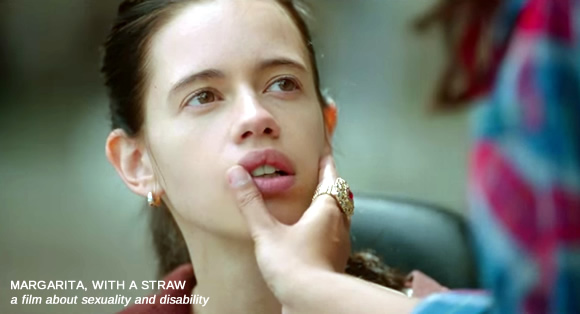“You wouldn’t believe a gentle stroke around my scar on my shoulder is my new G spot.”
In such an increasingly progressive society, issues related to sex are deemed relevant, yet still of an uncomfortable nature in British Asian households. Especially when it comes to sex and disability, even more.
Discussing sex for a British Asian with a disability is met with what can only be described as medieval psychology.
Such mentalities are comparable to a ‘Pear of Anguish’, painfully mutilating thought, desire and confidence from deep inside.
Damaging analogies of being diseased, perverted, and asexual have been heated by the masses throughout time. Moulding a cast iron rigid legacy for disabled people, requiring numerous tools to break and re-forge.
Amidst the British Asian community is the unfortunate yet widely shared view that a disabled person has no control, voice or opinion regarding their own sexual needs. Precious spices of human nature are crushed repeatedly by the heavy pestle of what is supposedly a loving partner.
It digresses further into the all-encompassing mortar that is effortlessly washed out ready to move on to hotter spices elsewhere, coined the ‘Chatterley Syndrome’.
Beautiful, intricately carved bodies and mesmerising thoughts are considered deviant in nature and assumed to be impotent. Their sexual desires are unacknowledged and suppressed or adversely seen as a dangerously insatiable thing that must be tamed.
As British Asians, diversity and beauty is not a new concept. From the depth of meaning within century-old carvings, be it the 4th Century Kangra Fort, Wall carvings at the Sun Temple, even the Khajuraho Temple, what is not fully understood should not be dismissed.
In today’s British Asian community, many have chosen to accept and stand proud of their identity inclusive of any disabilities. Sex and desires cannot be categorised as purely for the sole purpose of procreation. They burn harmoniously alongside each other as sandalwood, jasmine and neroli in the bedroom.
Old marble, artisan with an elaborate jasper and jade polished exterior reveals still a hugely patriarchal and masculine interior. This allows no room for the sexual expression of disabled women.
Ambika, 26, says: “I can’t even talk about what I want sexually with my worsening MS (Multiple Sclerosis) now that I am doubly incontinent I am treated like a child.”
Disabled people have the same sexual wants, needs and desires as everyone else. So why are they the unwilling chameleons of our society?
Jagan insists:
“Why is it so shocking that I have an active sex life? Just because I’m in a wheelchair and my sensations are affected; let me tell you plenty new ones have come about!”
Impairments that bring immobility, fatigue and muscle weakness, even pain, have said to improve sexual creativity. Discovery of new erogenous zones enables orgasms to be achieved from the most unlikely of places.
Reena, 29, says: “You wouldn’t believe a gentle stroke around my scar on my shoulder is my new G spot.”
As the heavy ornate necklace is caressed off, the wild anticipation of touching a collarbone allows minds to be transported where bodies cannot go.
The stereotypical assumption and preoccupation with orgasms cause many additional issues. Couples have stated that once they learned to detach that idea from their sexual experience they enjoyed far more heightened foreplay and pleasure from sensual erotic touch.
32-year-old Sadiya explains: “For the first time I had melted in his hands before he had even started to undress me.”
Vinesh, 38, adds: “I loved the way she learned that tantric massage for me, in such a way she could use it exactly where I wanted it.”
Many British Asian men have expressed the repulsion of being perceived as a charitable cause and donated sexual experiences as a form of kindness that is often belittling.
Faheem, 29, admits: “I want to be seen as a potential sexual partner as much as any other man.”
Excessive pressure to conform to the body beautiful stereotype is something that even non-disabled people struggle with. All types and shapes of bodies can be gently smeared with a turmeric paste and exude sexual magnetism.
Having disabilities can lead seductively to in-depth plans making sex more creative, more sensual and satisfying, even if it means travelling to another continent.
There has been invigorating debate around the sex industry and its role in providing services to some disabled people. However, countries like Japan Holland and Denmark already allow social workers to allocate limited funds for sexual requirements. This includes access to sex surrogates and masturbation services.
The topic changes from being poignant to hellishly blistering when psychiatric disability bore its devilish tail. People with psychiatric disability are assumed to have sexual behaviours deemed illegitimate.
Within the British Asian community, the popular misconception that all disabilities are hereditary and the notion of contaminating the next generation is a widely held belief. They are treated like curdled milk, not valued as tasty paneer.
Many are concerned that their relationship with sex is distorted and do not wish for added negative associations or assumptions to be made against them.
Much discussion regarding informed consent and free will come into play. Be it from speech, visual images or adapted devices and or sexual assistants; all are mechanisms to aid those with achieving sexual independence, regardless of their impairments.
The fight for sexual citizenship and equality within the sex and disability debate within British Asian society is certainly only beginning. It may take a lot of sweat and heated persuasion to convince the cynics that every person is wild at heart.































































